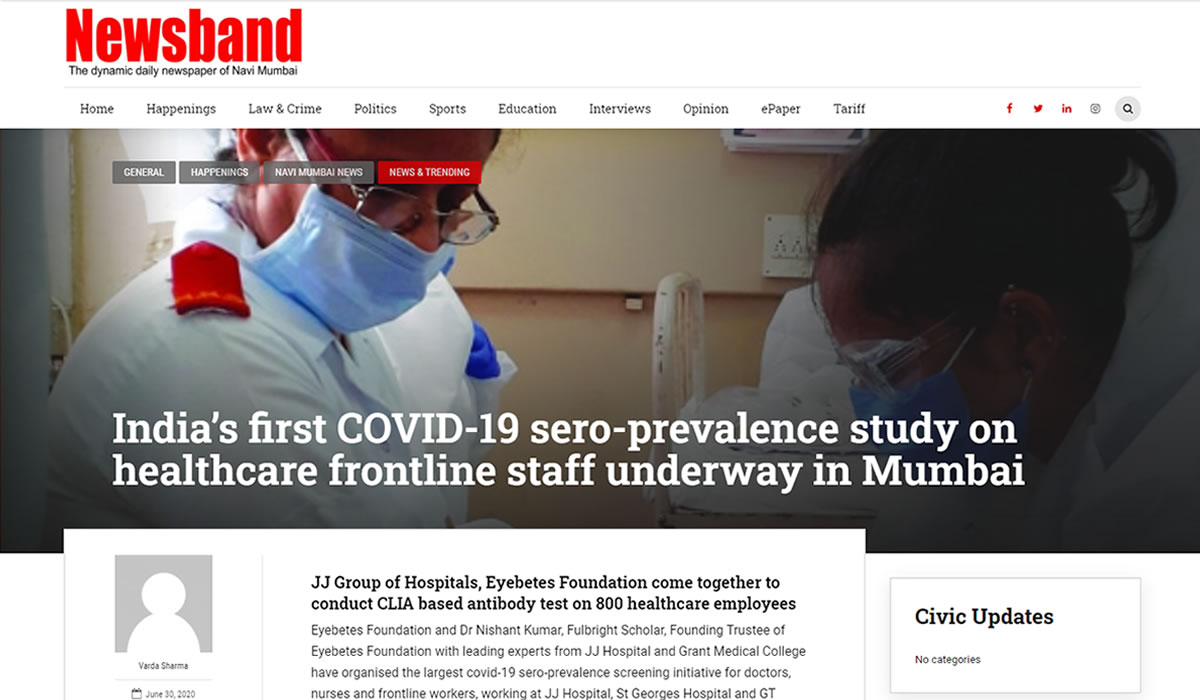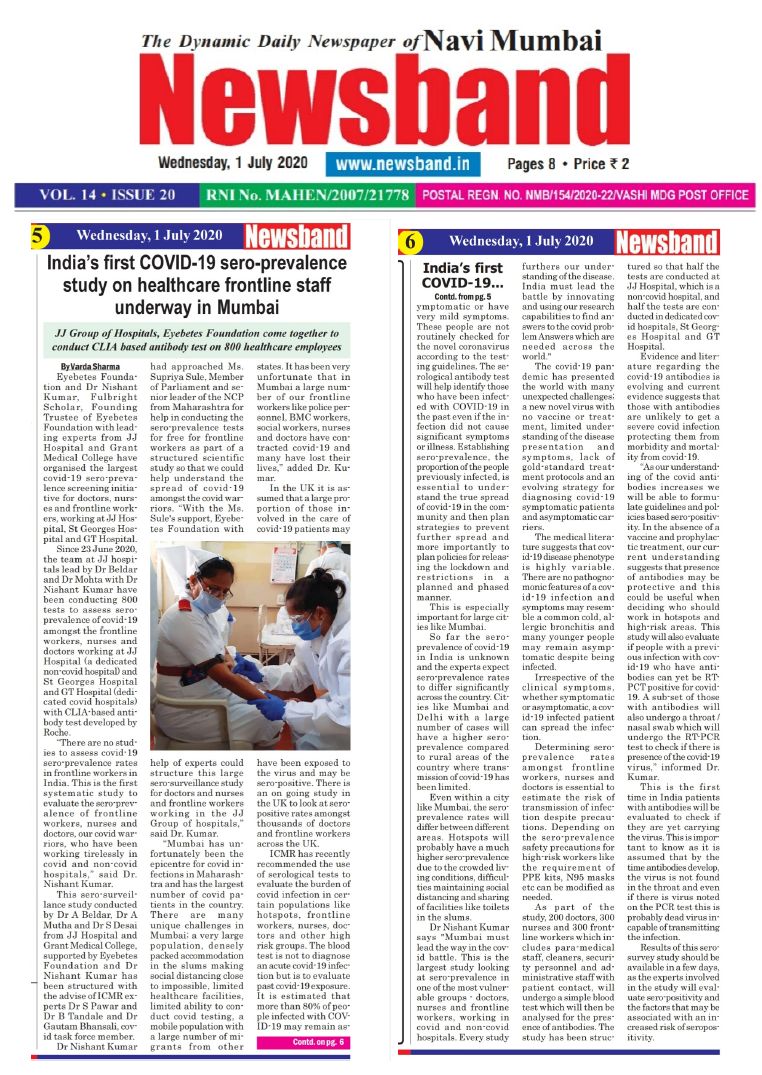India’s first COVID-19 sero-prevalence study on healthcare frontline staff underway in Mumbai

JJ Group of Hospitals, Eyebetes Foundation come together to conduct CLIA based antibody test on 800 healthcare employees
Eyebetes Foundation and Dr Nishant Kumar, Fulbright Scholar, Founding Trustee of Eyebetes Foundation with leading experts from JJ Hospital and Grant Medical College have organised the largest covid-19 sero-prevalence screening initiative for doctors, nurses and frontline workers, working at JJ Hospital, St Georges Hospital and GT Hospital.
Since 23 June 2020, the team at JJ hospitals lead by Dr Beldar and Dr Mohta with Dr Nishant Kumar have been conducting 800 tests to assess sero-prevalence of covid-19 amongst the frontline workers, nurses and doctors working at JJ Hospital (a dedicated non-covid hospital) and St Georges Hospital and GT Hospital (dedicated covid hospitals) with CLIA-based antibody test developed by Roche.
“There are no studies to assess covid-19 sero-prevalence rates in frontline workers in India. This is the first systematic study to evaluate the sero-prevalence of frontline workers, nurses and doctors, our covid warriors, who have been working tirelessly in covid and non-covid hospitals,” said Dr. Nishant Kumar.
This sero-surveillance study conducted by Dr A Beldar, Dr A Mutha and Dr S Desai from JJ Hospital and Grant Medical College, supported by Eyebetes Foundation and Dr Nishant Kumar has been structured with the advise of ICMR experts Dr S Pawar and Dr B Tandale and Dr Gautam Bhansali, covid task force member.
Dr Nishant Kumar had approached Ms. Supriya Sule, Member of Parliament and senior leader of the NCP from Maharashtra for help in conducting the sero-prevalence tests for free for frontline workers as part of a structured scientific study so that we could help understand the spread of covid-19 amongst the covid warriors. “With the Ms. Sule’s support, Eyebetes Foundation with help of experts could structure this large sero-surveillance study for doctors and nurses and frontline workers working in the JJ Group of hospitals,” said Dr. Kumar.
“Mumbai has unfortunately been the epicentre for covid infections in Maharashtra and has the largest number of covid patients in the country. There are many unique challenges in Mumbai; a very large population, densely packed accommodation in the slums making social distancing close to impossible, limited healthcare facilities, limited ability to conduct covid testing, a mobile population with a large number of migrants from other states. It has been very unfortunate that in Mumbai a large number of our frontline workers like police personnel, BMC workers, social workers, nurses and doctors have contracted covid-19 and many have lost their lives,” added Dr. Kumar.
In the UK it is assumed that a large proportion of those involved in the care of covid-19 patients may have been exposed to the virus and may be sero-positive. There is an on going study in the UK to look at sero-positive rates amongst thousands of doctors and frontline workers across the UK.
ICMR has recently recommended the use of serological tests to evaluate the burden of covid infection in certain populations like hotspots, frontline workers, nurses, doctors and other high risk groups. The blood test is not to diagnose an acute covid-19 infection but is to evaluate past covid-19 exposure. It is estimated that more than 80% of people infected with COVID-19 may remain asymptomatic or have very mild symptoms. These people are not routinely checked for the novel coronavirus according to the testing guidelines. The serological antibody test will help identify those who have been infected with COVID-19 in the past even if the infection did not cause significant symptoms or illness. Establishing sero-prevalence, the proportion of the people previously infected, is essential to understand the true spread of covid-19 in the community and then plan strategies to prevent further spread and more importantly to plan policies for releasing the lockdown and restrictions in a planned and phased manner.
This is especially important for large cities like Mumbai.
So far the sero-prevalence of covid-19 in India is unknown and the experts expect sero-prevalence rates to differ significantly across the country. Cities like Mumbai and Delhi with a large number of cases will have a higher sero-prevalence compared to rural areas of the country where transmission of covid-19 has been limited.
Even within a city like Mumbai, the sero-prevalence rates will differ between different areas. Hotspots will probably have a much higher sero-prevalence due to the crowded living conditions, difficulties maintaining social distancing and sharing of facilities like toilets in the slums.

Dr Nishant Kumar says “Mumbai must lead the way in the covid battle. This is the largest study looking at sero-prevalence in one of the most vulnerable groups – doctors, nurses and frontline workers, working in covid and non-covid hospitals. Every study furthers our understanding of the disease. India must lead the battle by innovating and using our research capabilities to find answers to the covid problem Answers which are needed across the world.”
The covid-19 pandemic has presented the world with many unexpected challenges; a new novel virus with no vaccine or treatment, limited understanding of the disease presentation and symptoms, lack of gold-standard treatment protocols and an evolving strategy for diagnosing covid-19 symptomatic patients and asymptomatic carriers.
The medical literature suggests that covid-19 disease phenotype is highly variable. There are no pathognomonic features of a covid-19 infection and symptoms may resemble a common cold, allergic bronchitis and many younger people may remain asymptomatic despite being infected.
Irrespective of the clinical symptoms, whether symptomatic or asymptomatic, a covid-19 infected patient can spread the infection.
Determining sero-prevalence rates amongst frontline workers, nurses and doctors is essential to estimate the risk of transmission of infection despite precautions. Depending on the sero-prevalence safety precautions for high-risk workers like the requirement of PPE kits, N95 masks etc can be modified as needed.
As part of the study, 200 doctors, 300 nurses and 300 frontline workers which includes para-medical staff, cleaners, security personnel and administrative staff with patient contact, will undergo a simple blood test which will then be analysed for the presence of antibodies. The study has been structured so that half the tests are conducted at JJ Hospital, which is a non-covid hospital, and half the tests are conducted in dedicated covid hospitals, St Georges Hospital and GT Hospital.
Evidence and literature regarding the covid-19 antibodies is evolving and current evidence suggests that those with antibodies are unlikely to get a severe covid infection protecting them from morbidity and mortality from covid-19.
“As our understanding of the covid antibodies increases we will be able to formulate guidelines and policies based sero-positivity. In the absence of a vaccine and prophylactic treatment, our current understanding suggests that presence of antibodies may be protective and this could be useful when deciding who should work in hotspots and high-risk areas. This study will also evaluate if people with a previous infection with covid-19 who have antibodies can yet be RT-PCT positive for covid-19. A sub-set of those with antibodies will also undergo a throat / nasal swab which will undergo the RT-PCR test to check if there is presence of the covid-19 virus,” informed Dr. Kumar.
This is the first time in India patients with antibodies will be evaluated to check if they are yet carrying the virus. This is important to know as it is assumed that by the time antibodies develop, the virus is not found in the throat and even if there is virus noted on the PCR test this is probably dead virus incapable of transmitting the infection.
Results of this sero-survey study should be available in a few days, as the experts involved in the study will evaluate sero-positivity and the factors that may be associated with an increased risk of seropositivity.
SOURCE: https://www.newsband.in


